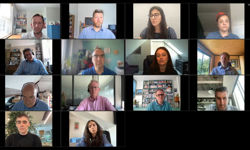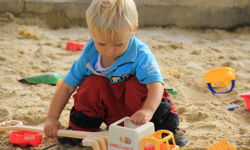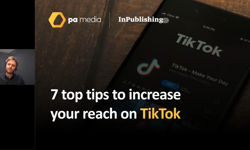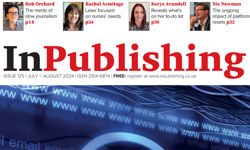
Reporting the Capitol riot
Tiffany Hsu and Katie Robertson in The New York Times: “Smashed cameras. Threats. The words ‘Murder the Media’ scratched into a door of the Capitol. As Trump supporters rampaged on Wednesday, incited by the president’s false claims of a stolen election, they hit on a secondary target: journalists. Members of the news media who were reporting from the streets and squares of Washington were threatened and surrounded, and their colleagues inside the Capitol were forced to shelter in secure locations for hours.”
Twitter bans Trump
Twitter in a statement after the Capitol riot: “After close review of recent Tweets from the @realDonaldTrump account and the context around them – specifically how they are being received and interpreted on and off Twitter – we have permanently suspended the account due to the risk of further incitement of violence.”
Prince Harry on press racism
Prince Harry interviewed by Oprah Winfrey: “The UK is not bigoted, the UK press is bigoted, specifically the tabloids. But, unfortunately, if the source of information is inherently corrupt or racist or biased, then that filters out to the rest of society.”
Society of Editors executive director Ian Murray in a statement: “The UK media has never shied away from holding a spotlight up to those in positions of power, celebrity or influence. If sometimes the questions asked are awkward and embarrassing, then so be it, but the press is most certainly not racist.”
Murray subsequently resigned, stating: “Since the statement was issued, the SoE has been heavily criticised. While I do not agree that the Society's statement was in any way intended to defend racism, I accept it could have been much clearer in its condemnation of bigotry and has clearly caused upset.”
Open letter to the Society of Editors signed by journalists of colour: “The Society of Editors should have used the comments by the Sussexes to start an open and constructive discussion about the best way to prevent racist coverage in future, including through addressing lack of representation in the UK media, particularly at a senior level. The blanket refusal to accept there is any bigotry in the British press is laughable, does a disservice to journalists of colour and shows an institution and an industry in denial.”
Piers Morgan on the Sussexes
Piers Morgan after Ofcom ruled in his favour over the comments about the Duke and Duchess of Sussex which led to his departure from ITV’s Good Morning Britain: “I’m delighted Ofcom has endorsed my right to disbelieve the Duke & Duchess of Sussex’s incendiary claims to Oprah Winfrey, many of which have proven to be untrue. This is a resounding victory for free speech and a resounding defeat for Princess Pinocchio.”
Murdoch on Morgan
Rupert Murdoch on Piers Morgan joining News UK’s new national television station talkTV and writing a column for the Sun: “Piers is the broadcaster every channel wants but is too afraid to hire. Piers is a brilliant presenter, a talented journalist and says what people are thinking and feeling.”
Prince William on Martin Bashir
Prince William on the Martin Bashir Panorama interview with his mother, Princess Diana: “It is my view that the deceitful way the interview was obtained substantially influenced what my mother said. The interview was a major contribution to making my parents’ relationship worse and has since hurt countless others. It brings indescribable sadness to know that the BBC’s failures contributed significantly to her fear, paranoia and isolation that I remember from those final years with her. But what saddens me most, is that if the BBC had properly investigated the complaints and concerns first raised in 1995, my mother would have known that she had been deceived. She was failed not just by a rogue reporter, but by leaders at the BBC who looked the other way rather than asking the tough questions.”
Neil on GB News
Andrew Neil in the Daily Mail on his departure as chairman of GB News: “I’m angry that what should have been my last big media gig – which, if we’d made it work, could have been great – turned out to be the worst eight months of my career, the worst by far, from early January to last weekend when I finally got free of everything. Don’t forget, I’ve been on the IRA hit list twice. I’ve had special protection – anti-terrorist forces outside my house. I’ve been on the jihadists’ hit list. This feels worse.”
GB News reviewed
Patrick Freyne reviewing GB News in the Irish Times: “It doesn’t take long for [Dan] Wootton to go full wingnut. On Tuesday, he highlights a baseless conspiracy theory about how lockdowns might ultimately be a government plot to curb carbon emissions. Does he have facts to back this up? No. But he’s the type of journalist who doesn’t need facts. He prefers to ask questions. You know, like your four-year-old: What is a dog? Why is the moon? Are spiders happy? Is Isis funding the BBC?”
Culture sec on BBC
Culture secretary Nadine Dorries in the Sun: “When I talk about access, I mean the make-up of who works at the BBC. They often tell us what percentage of their employees are gay, black or trans. I’m not talking about that. I’m talking about what the BBC is doing to represent the vast number of low socio-economic, non-diverse areas in the UK. Places like Breck Road, like Leicester and Bradford. Towns and cities with big council estates and strong working-class communities. It’s almost like they have forgotten about them.”
Climate change
From an editorial on climate change published in more than 200 health journals around the world: “As health professionals, we must do all we can to aid the transition to a sustainable, fairer, resilient, and healthier world. We, as editors of health journals, call for governments and other leaders to act, marking 2021 as the year that the world finally changes course.”
Covid wallies
Times columnist David Aaronovitch: “One of the depressing things about the pandemic is that it has shown that while some of our fellow journalists are brilliant at finding out and telling the public what they need to know, many others are grandstanding wallies.”
Digital fail
Josh Marshall in The Atlantic on job cuts in digital media: “The super-low costs of entry and the lack of geographic limitations that were key to the explosive growth of digital journalism were also key to its undoing. These new publications had no way to recreate the profitability and stability that the old regional monopolies had made possible… In digital publishing, scale was the god that failed. And thousands of journalists went along for the roller-coaster ride, without anyone warning them how it was bound to end.”
Jail threat
Sun editor-in-chief Victoria Newton: “Under sweeping reforms to the Official Secrets Act, journalists could be sent to jail for writing or publishing stories handed to them by whistleblowers. And the whistleblowers themselves could also be exposed to harsh penalties for being brave enough to risk their job – or sometimes even their life – to bring vital information forward to the media. It would mean editors like me – or from any newspaper, TV or radio organisation – could be treated like foreign spies and handed a long jail sentence if we handle leaked information.”
Abuse online
Reach's first online safety editor Dr Rebecca Whittington: “Journalists are vilified online on a daily basis simply for doing their jobs, with types of abuse ranging from personal attacks to hate crimes. Not only does this cause harm to the victims of abuse, but it also causes harm to the audience witnessing it. In my role, I aim to support staff facing online abuse and harassment and I also want to address the issue externally, by working with platforms and audiences to prevent and protect.”
Legal threats
Sean O'Neill in The Times: “The most potent threat to courageous journalism is not from baying mobs of conspiracy cranks or toxic Twitter trolls. It comes from super-rich men who cannot bear their personal and business affairs to be questioned, probed or criticised. When these men feel aggrieved, they turn to big London law firms who will do their bidding for a very fat fee.”
Johnson on journalism
Boris Johnson, in an online lesson with schoolchildren at Sedgehill Academy in Lewisham: “When you’re a journalist, it’s a great, great job, it’s a great profession. But the trouble is, sometimes you find yourself always abusing people or attacking people. Not that you want to abuse them or attack them, but you are being critical, when maybe you feel sometimes a bit guilty about that, because you haven't put yourself in the place of the person you're criticising.”
Journalists in Afghanistan
British media organisations in a letter to Downing Street requesting sanctuary for Afghans who worked with British journalists: “There is an urgent need to act quickly, as the threat to their lives is already acute and worsening. If left behind, those Afghan journalists and media employees who have played such a vital role informing the British public by working for British media will be left at the risk of persecution, of physical harm, incarceration, torture, or death.”
Nobel honour
The Nobel Committee awarding the Nobel Peace Prize 2021 to journalists Maria Ressa and Dmitry Muratov: “Ms Ressa and Mr Muratov are receiving the Peace Prize for their courageous fight for freedom of expression in the Philippines and Russia. At the same time, they are representatives of all journalists who stand up for this ideal in a world in which democracy and freedom of the press face increasingly adverse conditions.”
This article was first published in InPublishing magazine. If you would like to be added to the free mailing list, please register here.










